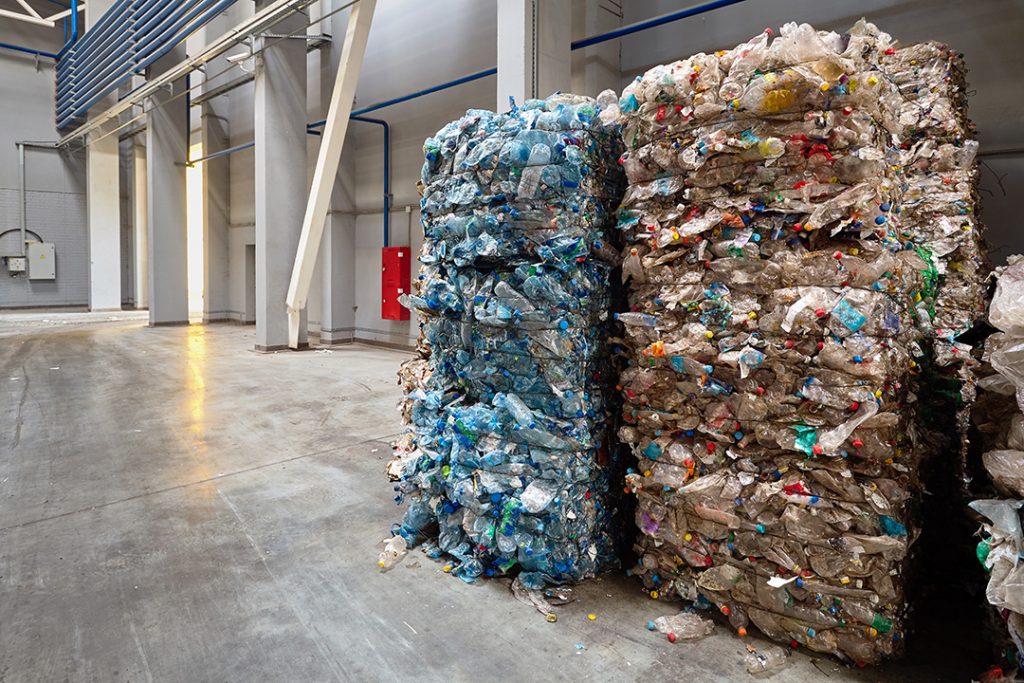
A new report shows the bulk of recyclables collected in Texas are processed at 31 MRFs. | RYosha / Shutterstock
A comprehensive look at the Lone Star State’s recycling system identified several strategies governments can use to bolster recycling market development in their jurisdictions, including recycled-content mandates and public procurement policies.
The Texas Commission on Environmental Quality (TCEQ) recently published the final report covering its “Recycling Market Development Plan.” The report was required by Senate Bill 649, which passed in 2019, and the state commissioned a project team that included consulting firms Burns & McDonnell and Circular Matters.
The study’s purpose was to “develop a plan to stimulate the use of recycled material feedstocks in processing and manufacturing,” according to the final report.
Totaling 318 pages, the report drew on a major survey effort, as well as annual state reports detailing collection volumes, the U.S. EPA annual Facts and Figures reports, industry group data, and more.
The report took into account common curbside recyclables, batteries and electronics, compost and other material streams. The survey received responses from numerous processors and facilities engaged in different types of end uses.
It includes an overview of diversion activities in 2019, when the state diverted more than 12.9 million tons across all MSW material categories. Those tonnages are compared with previous data from 2015, when the state diverted 9.2 million tons of material. The report attributes the growth to “significant expansion of yard trimmings, brush, and green waste composting.”
The bulk of recyclables collected in Texas are processed at 31 MRFs, according to the report.
Market development potential
One key component of the study was an analysis of how the state can boost its recycling markets. The report found a handful of strategies state and local governments could enact to support the market development goals.
“Recycling market development is a demand-pull activity – taking actions that stimulate materials demand and that increase the volume of actual market transactions,” the report states. “Market development does not focus on a supply-push approach in that the aim is not to simply add more and more materials to the market with the hopes that someone will buy it.”
Such demand-boosting strategies include supporting businesses that use recycled materials, encouraging manufacturers to use or increase use of recycled content, and promoting consumer purchasing of products made from recycled materials.
These broad strategies can be carried out through a handful of mechanisms. Governments can share information and technical assistance for market players to help connect recycling businesses. They can also enact preferential procurement programs that prioritize recycled-content products.
Governments can provide financial assistance, incentives or disincentives for certain activities to encourage recycled content use.
Finally, they can establish policies requiring recycled material use or banning certain items from disposal, as well as extended producer responsibility (EPR) systems, which make manufacturers responsible for funding recycling of their products.
The report noted that multiple tools may be relevant to tackling the same need, and that governments should weigh the tools to determine which is most effective and provides the most return on investment.
“For example, providing information and facilitation are flexible, low-cost, high-return tools when successfully implemented,” the report stated. “Providing funding and implementing policy should be considered when other options are not possible or are unlikely to yield adequate results. Where feasible, the state should seek to leverage existing resources before creating new ones.”
The report follows a related study on the economic impact of recycling in Texas. That study, also mandated by legislation, was released in late 2017.
More stories about research
- Study maps barriers to firms’ supply chain climate goals
- UMass alumni go small with trash-sorting robot pilot
- Closed Loop suggests small-format recycling improvements


